Jeff Bezos' Leadership: Applying Management Theories in Practice
VerifiedAdded on 2023/06/18
|11
|2895
|463
Essay
AI Summary
This essay critically evaluates Jeff Bezos' leadership qualities from the perspectives of various leadership and management theories. It begins by discussing trait and behavioral theories, highlighting Bezos' desire to lead, integrity, open-mindedness, and extraversion. It then explores situational and contingency theories, emphasizing Bezos' adaptability and situational favorableness. The essay further examines transformational and transactional theories, detailing Bezos' individualized consideration, inspirational motivation, idealized influence, and intellectual stimulation, as well as his use of reward and punishment systems. Distributed leadership is also analyzed, focusing on how Bezos mobilizes expertise at all business levels. Finally, the essay touches on ethical leadership and critical leadership perspectives, noting Bezos' adherence to ethical values and his aim for enhancing collective human agency. The analysis provides a comprehensive overview of Bezos' leadership style, drawing connections between theoretical frameworks and practical application within Amazon. Desklib provides access to similar essays and solved assignments for students.
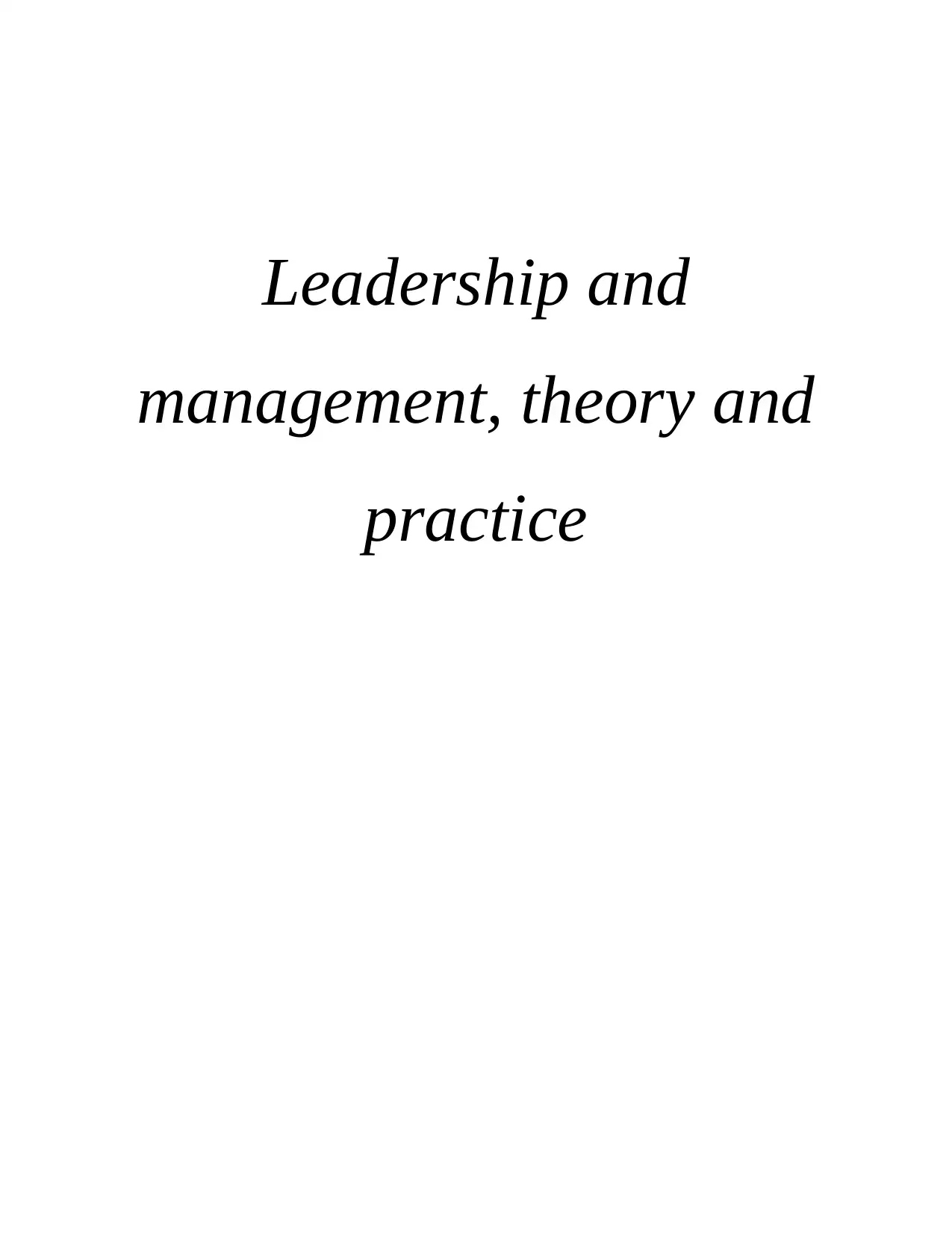
Leadership and
management, theory and
practice
management, theory and
practice
Paraphrase This Document
Need a fresh take? Get an instant paraphrase of this document with our AI Paraphraser
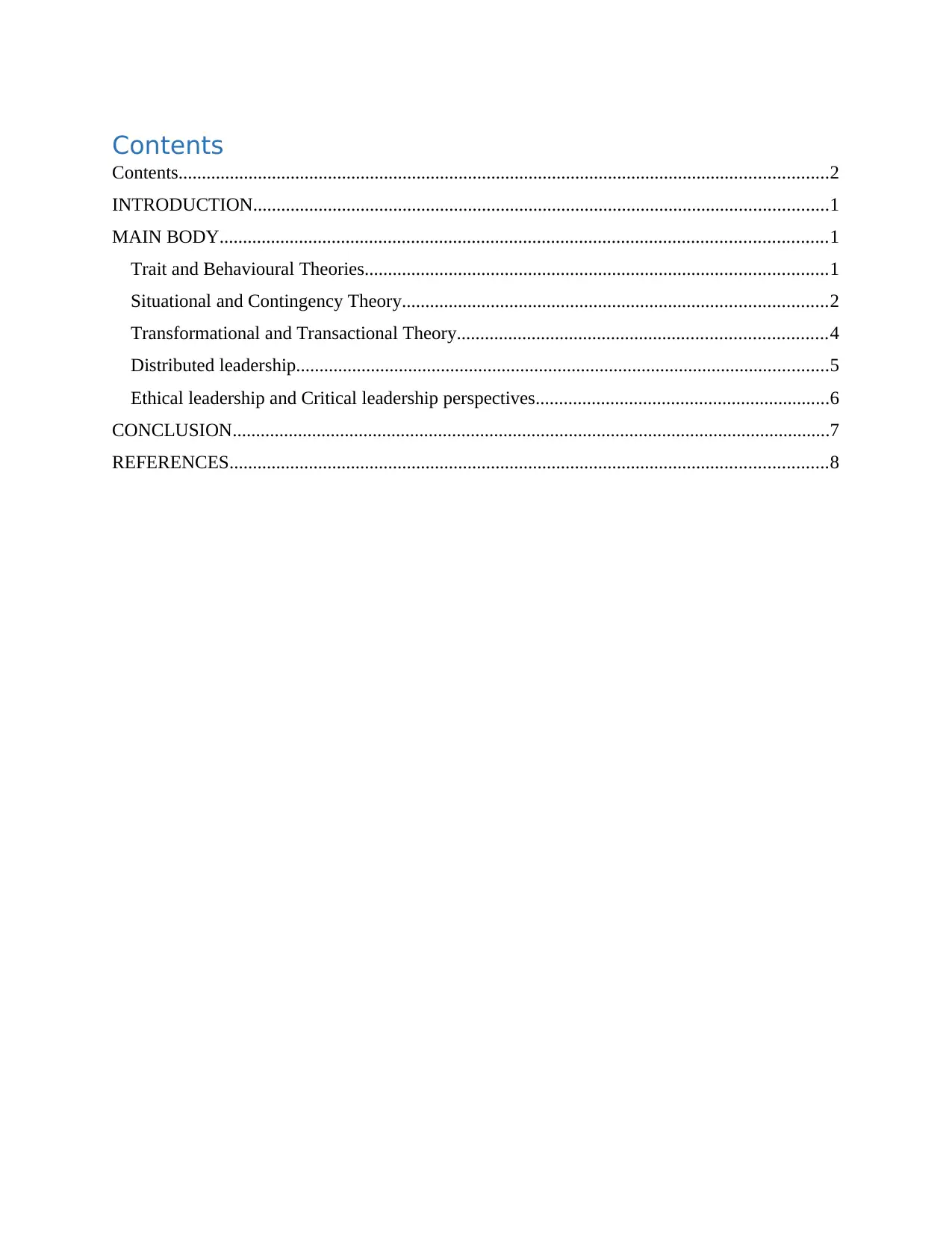
Contents
Contents...........................................................................................................................................2
INTRODUCTION...........................................................................................................................1
MAIN BODY..................................................................................................................................1
Trait and Behavioural Theories...................................................................................................1
Situational and Contingency Theory...........................................................................................2
Transformational and Transactional Theory...............................................................................4
Distributed leadership..................................................................................................................5
Ethical leadership and Critical leadership perspectives...............................................................6
CONCLUSION................................................................................................................................7
REFERENCES................................................................................................................................8
Contents...........................................................................................................................................2
INTRODUCTION...........................................................................................................................1
MAIN BODY..................................................................................................................................1
Trait and Behavioural Theories...................................................................................................1
Situational and Contingency Theory...........................................................................................2
Transformational and Transactional Theory...............................................................................4
Distributed leadership..................................................................................................................5
Ethical leadership and Critical leadership perspectives...............................................................6
CONCLUSION................................................................................................................................7
REFERENCES................................................................................................................................8

⊘ This is a preview!⊘
Do you want full access?
Subscribe today to unlock all pages.

Trusted by 1+ million students worldwide
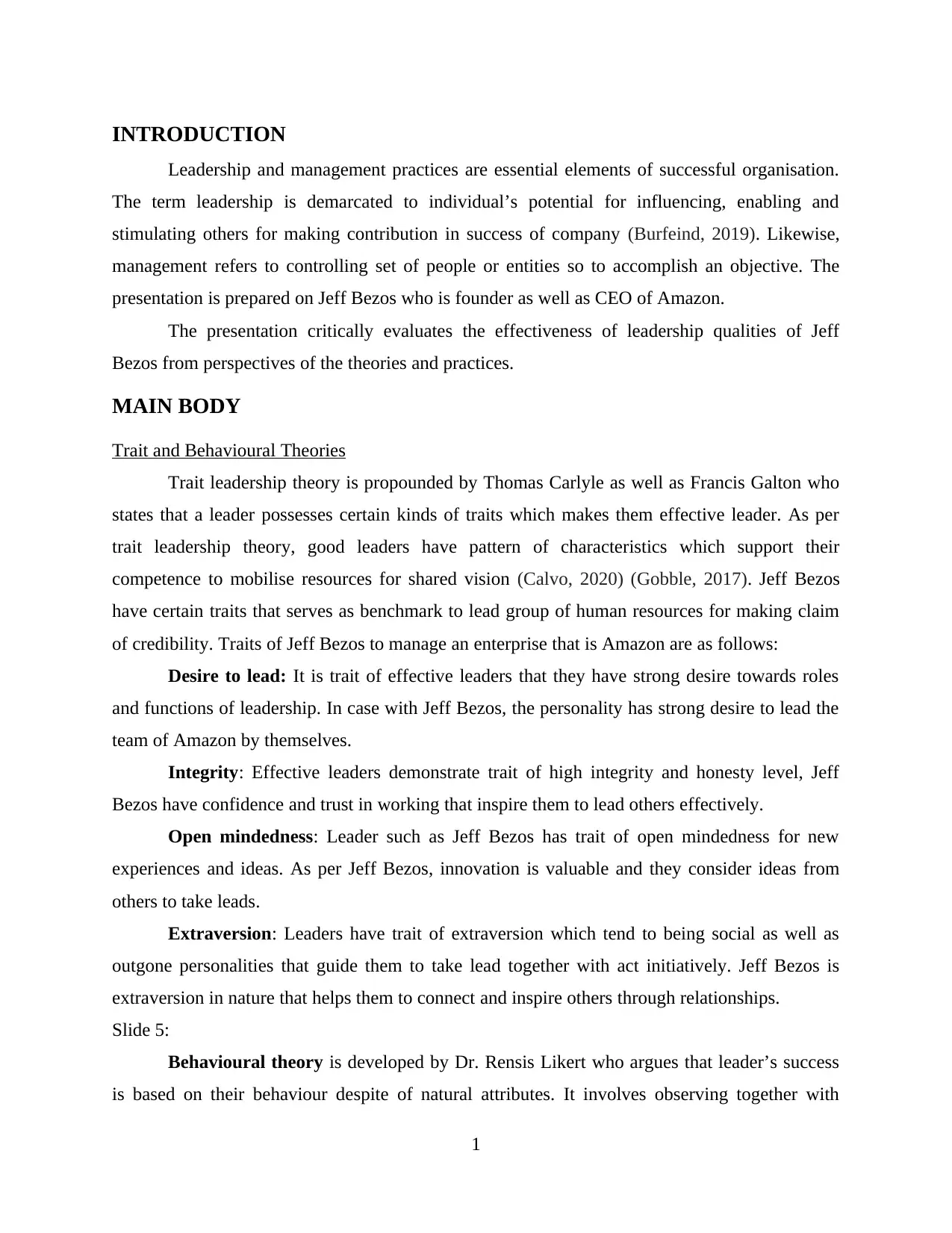
INTRODUCTION
Leadership and management practices are essential elements of successful organisation.
The term leadership is demarcated to individual’s potential for influencing, enabling and
stimulating others for making contribution in success of company (Burfeind, 2019). Likewise,
management refers to controlling set of people or entities so to accomplish an objective. The
presentation is prepared on Jeff Bezos who is founder as well as CEO of Amazon.
The presentation critically evaluates the effectiveness of leadership qualities of Jeff
Bezos from perspectives of the theories and practices.
MAIN BODY
Trait and Behavioural Theories
Trait leadership theory is propounded by Thomas Carlyle as well as Francis Galton who
states that a leader possesses certain kinds of traits which makes them effective leader. As per
trait leadership theory, good leaders have pattern of characteristics which support their
competence to mobilise resources for shared vision (Calvo, 2020) (Gobble, 2017). Jeff Bezos
have certain traits that serves as benchmark to lead group of human resources for making claim
of credibility. Traits of Jeff Bezos to manage an enterprise that is Amazon are as follows:
Desire to lead: It is trait of effective leaders that they have strong desire towards roles
and functions of leadership. In case with Jeff Bezos, the personality has strong desire to lead the
team of Amazon by themselves.
Integrity: Effective leaders demonstrate trait of high integrity and honesty level, Jeff
Bezos have confidence and trust in working that inspire them to lead others effectively.
Open mindedness: Leader such as Jeff Bezos has trait of open mindedness for new
experiences and ideas. As per Jeff Bezos, innovation is valuable and they consider ideas from
others to take leads.
Extraversion: Leaders have trait of extraversion which tend to being social as well as
outgone personalities that guide them to take lead together with act initiatively. Jeff Bezos is
extraversion in nature that helps them to connect and inspire others through relationships.
Slide 5:
Behavioural theory is developed by Dr. Rensis Likert who argues that leader’s success
is based on their behaviour despite of natural attributes. It involves observing together with
1
Leadership and management practices are essential elements of successful organisation.
The term leadership is demarcated to individual’s potential for influencing, enabling and
stimulating others for making contribution in success of company (Burfeind, 2019). Likewise,
management refers to controlling set of people or entities so to accomplish an objective. The
presentation is prepared on Jeff Bezos who is founder as well as CEO of Amazon.
The presentation critically evaluates the effectiveness of leadership qualities of Jeff
Bezos from perspectives of the theories and practices.
MAIN BODY
Trait and Behavioural Theories
Trait leadership theory is propounded by Thomas Carlyle as well as Francis Galton who
states that a leader possesses certain kinds of traits which makes them effective leader. As per
trait leadership theory, good leaders have pattern of characteristics which support their
competence to mobilise resources for shared vision (Calvo, 2020) (Gobble, 2017). Jeff Bezos
have certain traits that serves as benchmark to lead group of human resources for making claim
of credibility. Traits of Jeff Bezos to manage an enterprise that is Amazon are as follows:
Desire to lead: It is trait of effective leaders that they have strong desire towards roles
and functions of leadership. In case with Jeff Bezos, the personality has strong desire to lead the
team of Amazon by themselves.
Integrity: Effective leaders demonstrate trait of high integrity and honesty level, Jeff
Bezos have confidence and trust in working that inspire them to lead others effectively.
Open mindedness: Leader such as Jeff Bezos has trait of open mindedness for new
experiences and ideas. As per Jeff Bezos, innovation is valuable and they consider ideas from
others to take leads.
Extraversion: Leaders have trait of extraversion which tend to being social as well as
outgone personalities that guide them to take lead together with act initiatively. Jeff Bezos is
extraversion in nature that helps them to connect and inspire others through relationships.
Slide 5:
Behavioural theory is developed by Dr. Rensis Likert who argues that leader’s success
is based on their behaviour despite of natural attributes. It involves observing together with
1
Paraphrase This Document
Need a fresh take? Get an instant paraphrase of this document with our AI Paraphraser
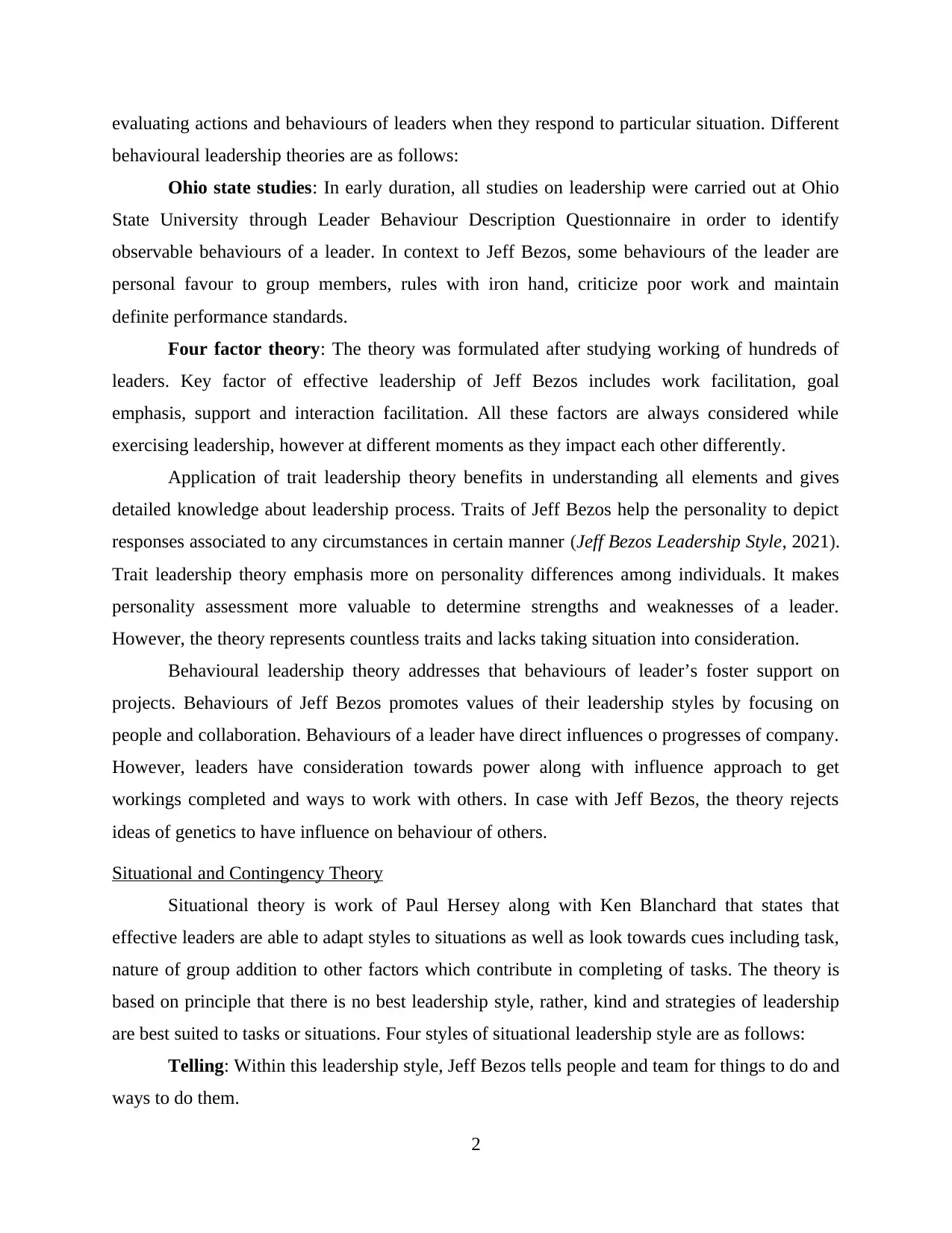
evaluating actions and behaviours of leaders when they respond to particular situation. Different
behavioural leadership theories are as follows:
Ohio state studies: In early duration, all studies on leadership were carried out at Ohio
State University through Leader Behaviour Description Questionnaire in order to identify
observable behaviours of a leader. In context to Jeff Bezos, some behaviours of the leader are
personal favour to group members, rules with iron hand, criticize poor work and maintain
definite performance standards.
Four factor theory: The theory was formulated after studying working of hundreds of
leaders. Key factor of effective leadership of Jeff Bezos includes work facilitation, goal
emphasis, support and interaction facilitation. All these factors are always considered while
exercising leadership, however at different moments as they impact each other differently.
Application of trait leadership theory benefits in understanding all elements and gives
detailed knowledge about leadership process. Traits of Jeff Bezos help the personality to depict
responses associated to any circumstances in certain manner (Jeff Bezos Leadership Style, 2021).
Trait leadership theory emphasis more on personality differences among individuals. It makes
personality assessment more valuable to determine strengths and weaknesses of a leader.
However, the theory represents countless traits and lacks taking situation into consideration.
Behavioural leadership theory addresses that behaviours of leader’s foster support on
projects. Behaviours of Jeff Bezos promotes values of their leadership styles by focusing on
people and collaboration. Behaviours of a leader have direct influences o progresses of company.
However, leaders have consideration towards power along with influence approach to get
workings completed and ways to work with others. In case with Jeff Bezos, the theory rejects
ideas of genetics to have influence on behaviour of others.
Situational and Contingency Theory
Situational theory is work of Paul Hersey along with Ken Blanchard that states that
effective leaders are able to adapt styles to situations as well as look towards cues including task,
nature of group addition to other factors which contribute in completing of tasks. The theory is
based on principle that there is no best leadership style, rather, kind and strategies of leadership
are best suited to tasks or situations. Four styles of situational leadership style are as follows:
Telling: Within this leadership style, Jeff Bezos tells people and team for things to do and
ways to do them.
2
behavioural leadership theories are as follows:
Ohio state studies: In early duration, all studies on leadership were carried out at Ohio
State University through Leader Behaviour Description Questionnaire in order to identify
observable behaviours of a leader. In context to Jeff Bezos, some behaviours of the leader are
personal favour to group members, rules with iron hand, criticize poor work and maintain
definite performance standards.
Four factor theory: The theory was formulated after studying working of hundreds of
leaders. Key factor of effective leadership of Jeff Bezos includes work facilitation, goal
emphasis, support and interaction facilitation. All these factors are always considered while
exercising leadership, however at different moments as they impact each other differently.
Application of trait leadership theory benefits in understanding all elements and gives
detailed knowledge about leadership process. Traits of Jeff Bezos help the personality to depict
responses associated to any circumstances in certain manner (Jeff Bezos Leadership Style, 2021).
Trait leadership theory emphasis more on personality differences among individuals. It makes
personality assessment more valuable to determine strengths and weaknesses of a leader.
However, the theory represents countless traits and lacks taking situation into consideration.
Behavioural leadership theory addresses that behaviours of leader’s foster support on
projects. Behaviours of Jeff Bezos promotes values of their leadership styles by focusing on
people and collaboration. Behaviours of a leader have direct influences o progresses of company.
However, leaders have consideration towards power along with influence approach to get
workings completed and ways to work with others. In case with Jeff Bezos, the theory rejects
ideas of genetics to have influence on behaviour of others.
Situational and Contingency Theory
Situational theory is work of Paul Hersey along with Ken Blanchard that states that
effective leaders are able to adapt styles to situations as well as look towards cues including task,
nature of group addition to other factors which contribute in completing of tasks. The theory is
based on principle that there is no best leadership style, rather, kind and strategies of leadership
are best suited to tasks or situations. Four styles of situational leadership style are as follows:
Telling: Within this leadership style, Jeff Bezos tells people and team for things to do and
ways to do them.
2
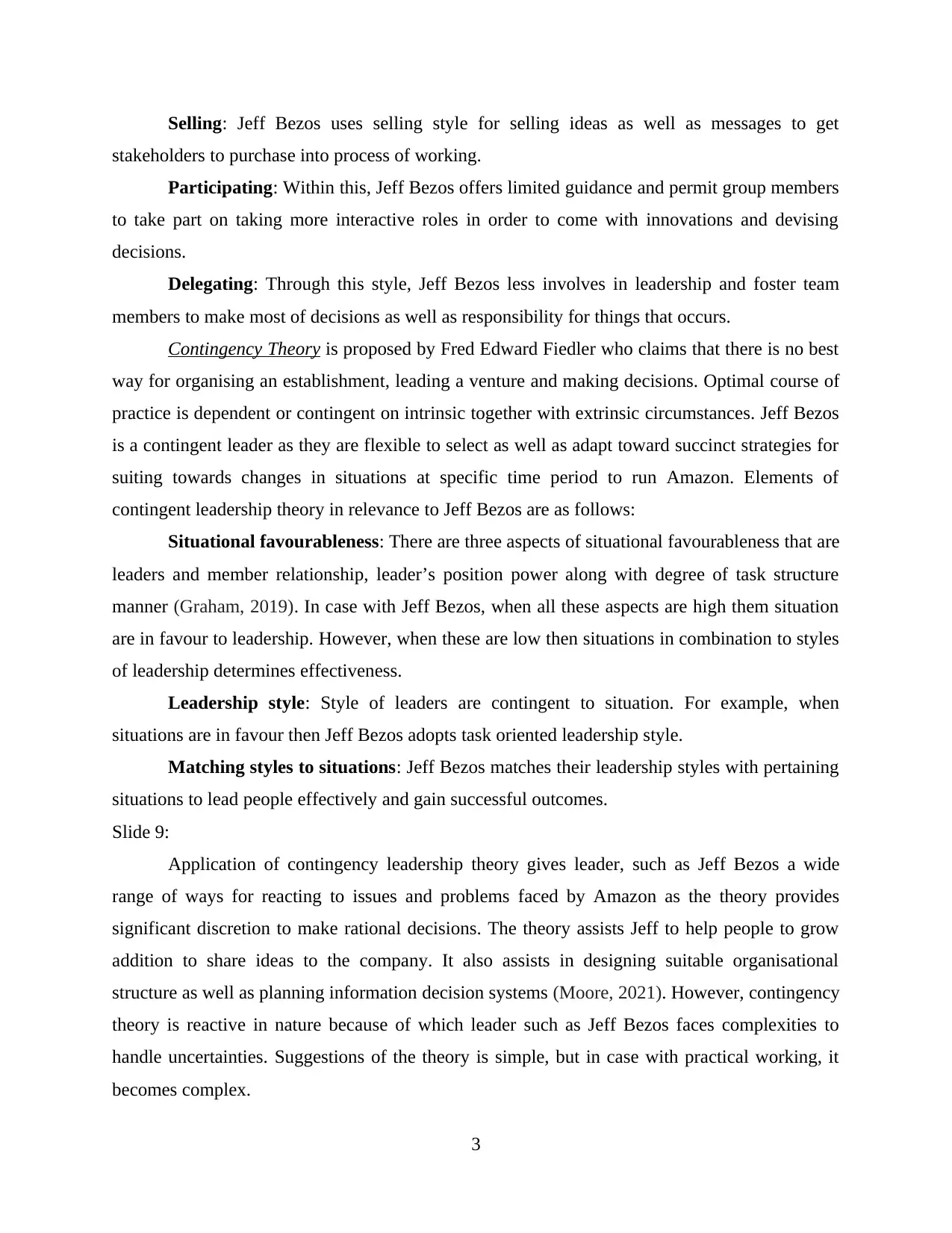
Selling: Jeff Bezos uses selling style for selling ideas as well as messages to get
stakeholders to purchase into process of working.
Participating: Within this, Jeff Bezos offers limited guidance and permit group members
to take part on taking more interactive roles in order to come with innovations and devising
decisions.
Delegating: Through this style, Jeff Bezos less involves in leadership and foster team
members to make most of decisions as well as responsibility for things that occurs.
Contingency Theory is proposed by Fred Edward Fiedler who claims that there is no best
way for organising an establishment, leading a venture and making decisions. Optimal course of
practice is dependent or contingent on intrinsic together with extrinsic circumstances. Jeff Bezos
is a contingent leader as they are flexible to select as well as adapt toward succinct strategies for
suiting towards changes in situations at specific time period to run Amazon. Elements of
contingent leadership theory in relevance to Jeff Bezos are as follows:
Situational favourableness: There are three aspects of situational favourableness that are
leaders and member relationship, leader’s position power along with degree of task structure
manner (Graham, 2019). In case with Jeff Bezos, when all these aspects are high them situation
are in favour to leadership. However, when these are low then situations in combination to styles
of leadership determines effectiveness.
Leadership style: Style of leaders are contingent to situation. For example, when
situations are in favour then Jeff Bezos adopts task oriented leadership style.
Matching styles to situations: Jeff Bezos matches their leadership styles with pertaining
situations to lead people effectively and gain successful outcomes.
Slide 9:
Application of contingency leadership theory gives leader, such as Jeff Bezos a wide
range of ways for reacting to issues and problems faced by Amazon as the theory provides
significant discretion to make rational decisions. The theory assists Jeff to help people to grow
addition to share ideas to the company. It also assists in designing suitable organisational
structure as well as planning information decision systems (Moore, 2021). However, contingency
theory is reactive in nature because of which leader such as Jeff Bezos faces complexities to
handle uncertainties. Suggestions of the theory is simple, but in case with practical working, it
becomes complex.
3
stakeholders to purchase into process of working.
Participating: Within this, Jeff Bezos offers limited guidance and permit group members
to take part on taking more interactive roles in order to come with innovations and devising
decisions.
Delegating: Through this style, Jeff Bezos less involves in leadership and foster team
members to make most of decisions as well as responsibility for things that occurs.
Contingency Theory is proposed by Fred Edward Fiedler who claims that there is no best
way for organising an establishment, leading a venture and making decisions. Optimal course of
practice is dependent or contingent on intrinsic together with extrinsic circumstances. Jeff Bezos
is a contingent leader as they are flexible to select as well as adapt toward succinct strategies for
suiting towards changes in situations at specific time period to run Amazon. Elements of
contingent leadership theory in relevance to Jeff Bezos are as follows:
Situational favourableness: There are three aspects of situational favourableness that are
leaders and member relationship, leader’s position power along with degree of task structure
manner (Graham, 2019). In case with Jeff Bezos, when all these aspects are high them situation
are in favour to leadership. However, when these are low then situations in combination to styles
of leadership determines effectiveness.
Leadership style: Style of leaders are contingent to situation. For example, when
situations are in favour then Jeff Bezos adopts task oriented leadership style.
Matching styles to situations: Jeff Bezos matches their leadership styles with pertaining
situations to lead people effectively and gain successful outcomes.
Slide 9:
Application of contingency leadership theory gives leader, such as Jeff Bezos a wide
range of ways for reacting to issues and problems faced by Amazon as the theory provides
significant discretion to make rational decisions. The theory assists Jeff to help people to grow
addition to share ideas to the company. It also assists in designing suitable organisational
structure as well as planning information decision systems (Moore, 2021). However, contingency
theory is reactive in nature because of which leader such as Jeff Bezos faces complexities to
handle uncertainties. Suggestions of the theory is simple, but in case with practical working, it
becomes complex.
3
⊘ This is a preview!⊘
Do you want full access?
Subscribe today to unlock all pages.

Trusted by 1+ million students worldwide
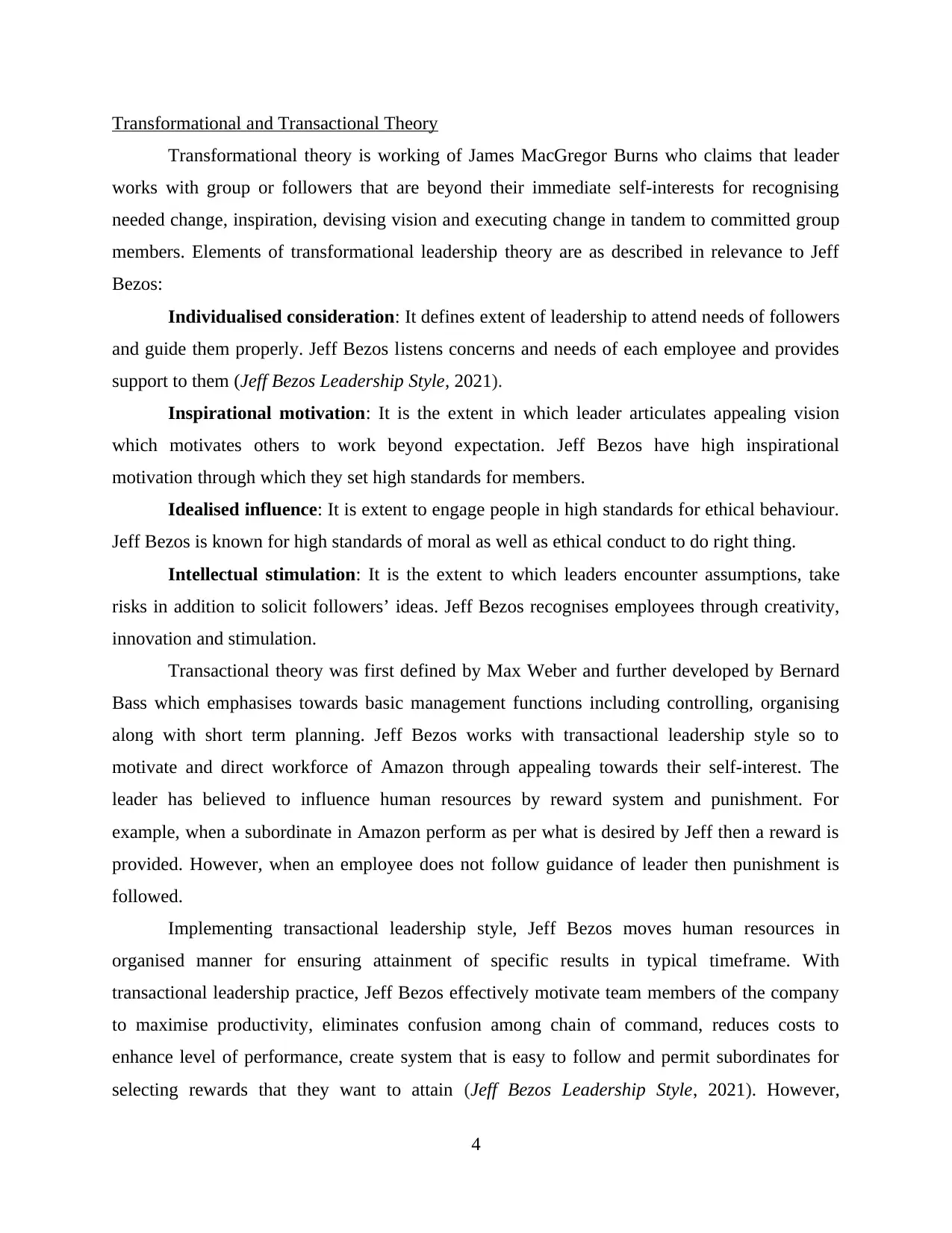
Transformational and Transactional Theory
Transformational theory is working of James MacGregor Burns who claims that leader
works with group or followers that are beyond their immediate self-interests for recognising
needed change, inspiration, devising vision and executing change in tandem to committed group
members. Elements of transformational leadership theory are as described in relevance to Jeff
Bezos:
Individualised consideration: It defines extent of leadership to attend needs of followers
and guide them properly. Jeff Bezos listens concerns and needs of each employee and provides
support to them (Jeff Bezos Leadership Style, 2021).
Inspirational motivation: It is the extent in which leader articulates appealing vision
which motivates others to work beyond expectation. Jeff Bezos have high inspirational
motivation through which they set high standards for members.
Idealised influence: It is extent to engage people in high standards for ethical behaviour.
Jeff Bezos is known for high standards of moral as well as ethical conduct to do right thing.
Intellectual stimulation: It is the extent to which leaders encounter assumptions, take
risks in addition to solicit followers’ ideas. Jeff Bezos recognises employees through creativity,
innovation and stimulation.
Transactional theory was first defined by Max Weber and further developed by Bernard
Bass which emphasises towards basic management functions including controlling, organising
along with short term planning. Jeff Bezos works with transactional leadership style so to
motivate and direct workforce of Amazon through appealing towards their self-interest. The
leader has believed to influence human resources by reward system and punishment. For
example, when a subordinate in Amazon perform as per what is desired by Jeff then a reward is
provided. However, when an employee does not follow guidance of leader then punishment is
followed.
Implementing transactional leadership style, Jeff Bezos moves human resources in
organised manner for ensuring attainment of specific results in typical timeframe. With
transactional leadership practice, Jeff Bezos effectively motivate team members of the company
to maximise productivity, eliminates confusion among chain of command, reduces costs to
enhance level of performance, create system that is easy to follow and permit subordinates for
selecting rewards that they want to attain (Jeff Bezos Leadership Style, 2021). However,
4
Transformational theory is working of James MacGregor Burns who claims that leader
works with group or followers that are beyond their immediate self-interests for recognising
needed change, inspiration, devising vision and executing change in tandem to committed group
members. Elements of transformational leadership theory are as described in relevance to Jeff
Bezos:
Individualised consideration: It defines extent of leadership to attend needs of followers
and guide them properly. Jeff Bezos listens concerns and needs of each employee and provides
support to them (Jeff Bezos Leadership Style, 2021).
Inspirational motivation: It is the extent in which leader articulates appealing vision
which motivates others to work beyond expectation. Jeff Bezos have high inspirational
motivation through which they set high standards for members.
Idealised influence: It is extent to engage people in high standards for ethical behaviour.
Jeff Bezos is known for high standards of moral as well as ethical conduct to do right thing.
Intellectual stimulation: It is the extent to which leaders encounter assumptions, take
risks in addition to solicit followers’ ideas. Jeff Bezos recognises employees through creativity,
innovation and stimulation.
Transactional theory was first defined by Max Weber and further developed by Bernard
Bass which emphasises towards basic management functions including controlling, organising
along with short term planning. Jeff Bezos works with transactional leadership style so to
motivate and direct workforce of Amazon through appealing towards their self-interest. The
leader has believed to influence human resources by reward system and punishment. For
example, when a subordinate in Amazon perform as per what is desired by Jeff then a reward is
provided. However, when an employee does not follow guidance of leader then punishment is
followed.
Implementing transactional leadership style, Jeff Bezos moves human resources in
organised manner for ensuring attainment of specific results in typical timeframe. With
transactional leadership practice, Jeff Bezos effectively motivate team members of the company
to maximise productivity, eliminates confusion among chain of command, reduces costs to
enhance level of performance, create system that is easy to follow and permit subordinates for
selecting rewards that they want to attain (Jeff Bezos Leadership Style, 2021). However,
4
Paraphrase This Document
Need a fresh take? Get an instant paraphrase of this document with our AI Paraphraser
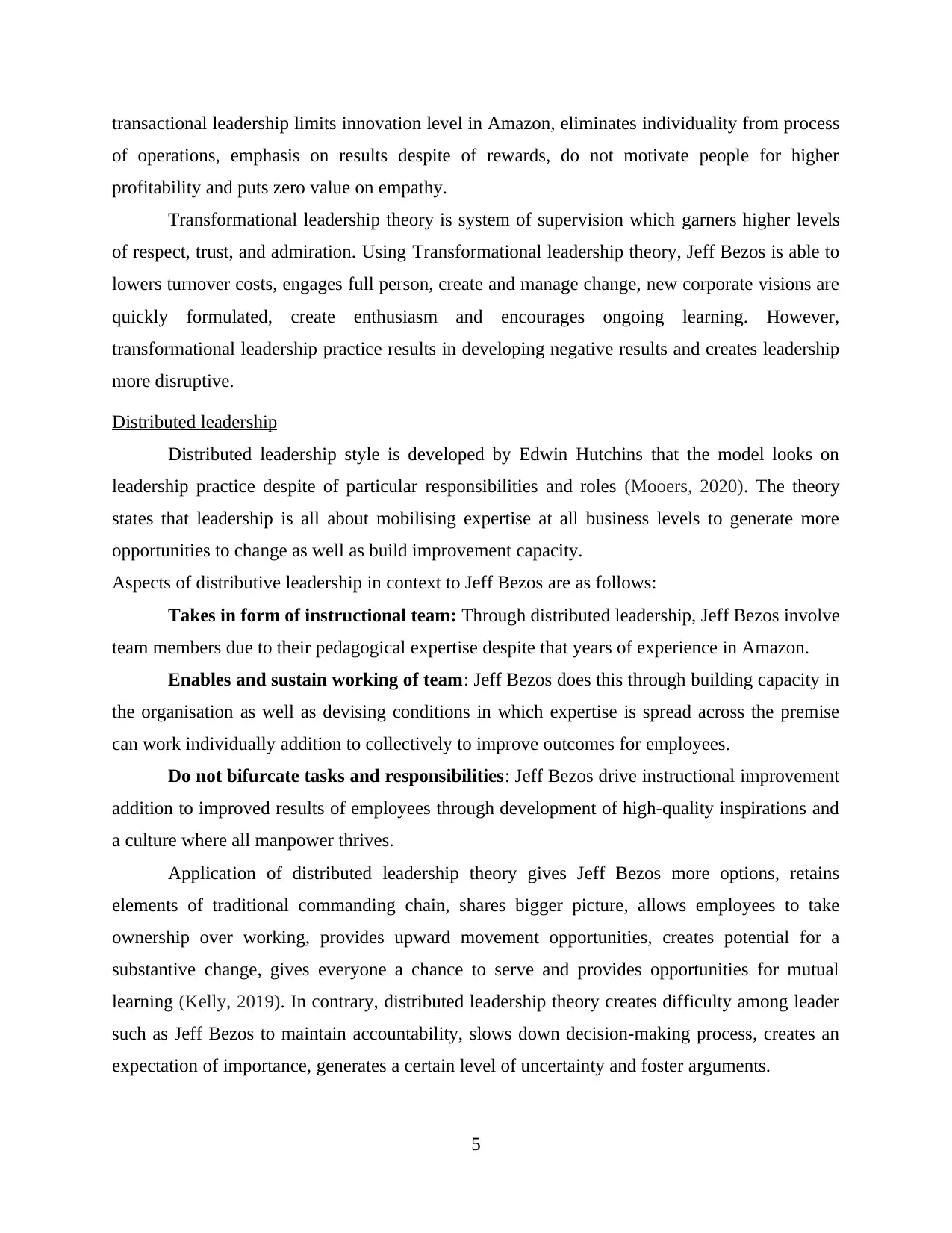
transactional leadership limits innovation level in Amazon, eliminates individuality from process
of operations, emphasis on results despite of rewards, do not motivate people for higher
profitability and puts zero value on empathy.
Transformational leadership theory is system of supervision which garners higher levels
of respect, trust, and admiration. Using Transformational leadership theory, Jeff Bezos is able to
lowers turnover costs, engages full person, create and manage change, new corporate visions are
quickly formulated, create enthusiasm and encourages ongoing learning. However,
transformational leadership practice results in developing negative results and creates leadership
more disruptive.
Distributed leadership
Distributed leadership style is developed by Edwin Hutchins that the model looks on
leadership practice despite of particular responsibilities and roles (Mooers, 2020). The theory
states that leadership is all about mobilising expertise at all business levels to generate more
opportunities to change as well as build improvement capacity.
Aspects of distributive leadership in context to Jeff Bezos are as follows:
Takes in form of instructional team: Through distributed leadership, Jeff Bezos involve
team members due to their pedagogical expertise despite that years of experience in Amazon.
Enables and sustain working of team: Jeff Bezos does this through building capacity in
the organisation as well as devising conditions in which expertise is spread across the premise
can work individually addition to collectively to improve outcomes for employees.
Do not bifurcate tasks and responsibilities: Jeff Bezos drive instructional improvement
addition to improved results of employees through development of high-quality inspirations and
a culture where all manpower thrives.
Application of distributed leadership theory gives Jeff Bezos more options, retains
elements of traditional commanding chain, shares bigger picture, allows employees to take
ownership over working, provides upward movement opportunities, creates potential for a
substantive change, gives everyone a chance to serve and provides opportunities for mutual
learning (Kelly, 2019). In contrary, distributed leadership theory creates difficulty among leader
such as Jeff Bezos to maintain accountability, slows down decision-making process, creates an
expectation of importance, generates a certain level of uncertainty and foster arguments.
5
of operations, emphasis on results despite of rewards, do not motivate people for higher
profitability and puts zero value on empathy.
Transformational leadership theory is system of supervision which garners higher levels
of respect, trust, and admiration. Using Transformational leadership theory, Jeff Bezos is able to
lowers turnover costs, engages full person, create and manage change, new corporate visions are
quickly formulated, create enthusiasm and encourages ongoing learning. However,
transformational leadership practice results in developing negative results and creates leadership
more disruptive.
Distributed leadership
Distributed leadership style is developed by Edwin Hutchins that the model looks on
leadership practice despite of particular responsibilities and roles (Mooers, 2020). The theory
states that leadership is all about mobilising expertise at all business levels to generate more
opportunities to change as well as build improvement capacity.
Aspects of distributive leadership in context to Jeff Bezos are as follows:
Takes in form of instructional team: Through distributed leadership, Jeff Bezos involve
team members due to their pedagogical expertise despite that years of experience in Amazon.
Enables and sustain working of team: Jeff Bezos does this through building capacity in
the organisation as well as devising conditions in which expertise is spread across the premise
can work individually addition to collectively to improve outcomes for employees.
Do not bifurcate tasks and responsibilities: Jeff Bezos drive instructional improvement
addition to improved results of employees through development of high-quality inspirations and
a culture where all manpower thrives.
Application of distributed leadership theory gives Jeff Bezos more options, retains
elements of traditional commanding chain, shares bigger picture, allows employees to take
ownership over working, provides upward movement opportunities, creates potential for a
substantive change, gives everyone a chance to serve and provides opportunities for mutual
learning (Kelly, 2019). In contrary, distributed leadership theory creates difficulty among leader
such as Jeff Bezos to maintain accountability, slows down decision-making process, creates an
expectation of importance, generates a certain level of uncertainty and foster arguments.
5
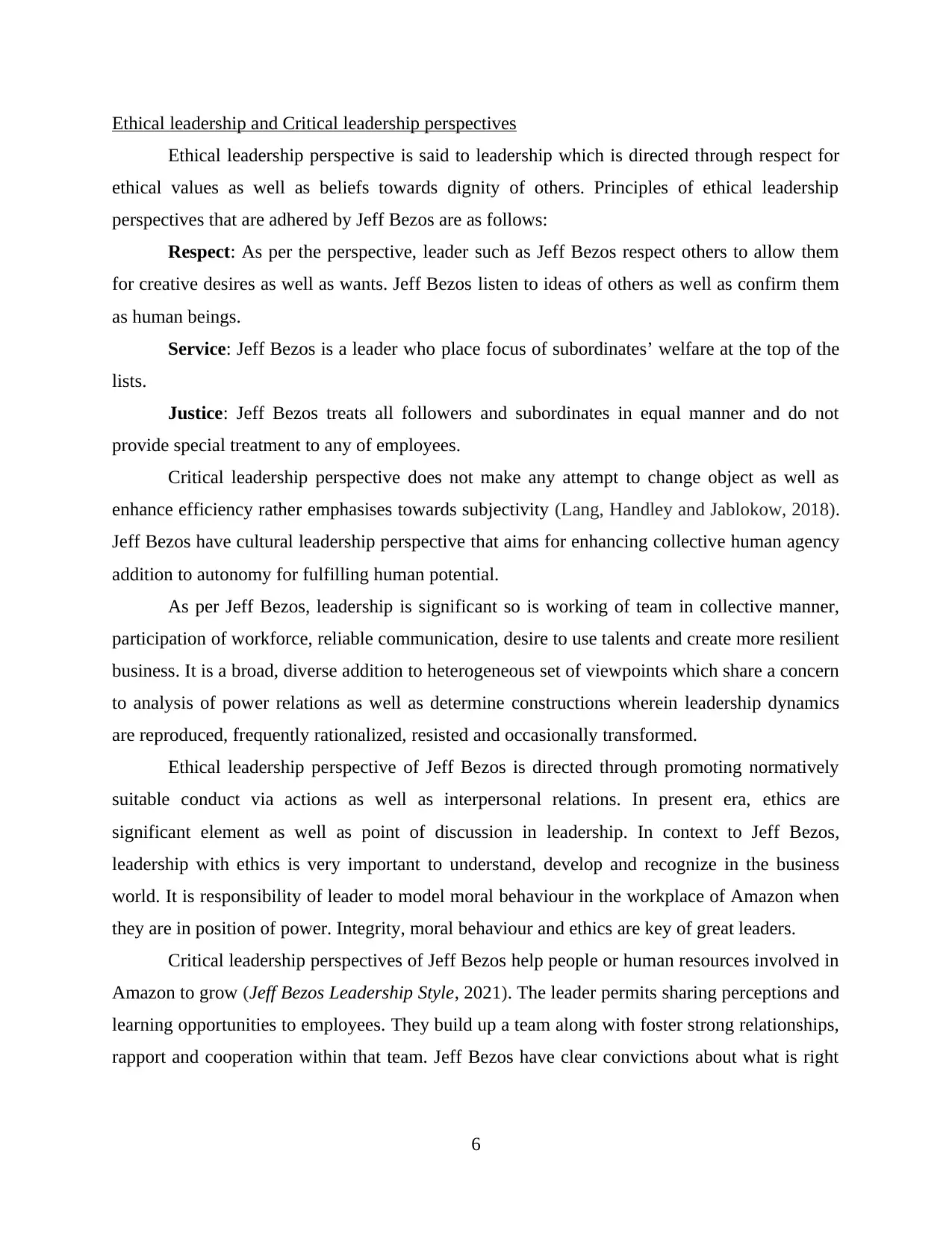
Ethical leadership and Critical leadership perspectives
Ethical leadership perspective is said to leadership which is directed through respect for
ethical values as well as beliefs towards dignity of others. Principles of ethical leadership
perspectives that are adhered by Jeff Bezos are as follows:
Respect: As per the perspective, leader such as Jeff Bezos respect others to allow them
for creative desires as well as wants. Jeff Bezos listen to ideas of others as well as confirm them
as human beings.
Service: Jeff Bezos is a leader who place focus of subordinates’ welfare at the top of the
lists.
Justice: Jeff Bezos treats all followers and subordinates in equal manner and do not
provide special treatment to any of employees.
Critical leadership perspective does not make any attempt to change object as well as
enhance efficiency rather emphasises towards subjectivity (Lang, Handley and Jablokow, 2018).
Jeff Bezos have cultural leadership perspective that aims for enhancing collective human agency
addition to autonomy for fulfilling human potential.
As per Jeff Bezos, leadership is significant so is working of team in collective manner,
participation of workforce, reliable communication, desire to use talents and create more resilient
business. It is a broad, diverse addition to heterogeneous set of viewpoints which share a concern
to analysis of power relations as well as determine constructions wherein leadership dynamics
are reproduced, frequently rationalized, resisted and occasionally transformed.
Ethical leadership perspective of Jeff Bezos is directed through promoting normatively
suitable conduct via actions as well as interpersonal relations. In present era, ethics are
significant element as well as point of discussion in leadership. In context to Jeff Bezos,
leadership with ethics is very important to understand, develop and recognize in the business
world. It is responsibility of leader to model moral behaviour in the workplace of Amazon when
they are in position of power. Integrity, moral behaviour and ethics are key of great leaders.
Critical leadership perspectives of Jeff Bezos help people or human resources involved in
Amazon to grow (Jeff Bezos Leadership Style, 2021). The leader permits sharing perceptions and
learning opportunities to employees. They build up a team along with foster strong relationships,
rapport and cooperation within that team. Jeff Bezos have clear convictions about what is right
6
Ethical leadership perspective is said to leadership which is directed through respect for
ethical values as well as beliefs towards dignity of others. Principles of ethical leadership
perspectives that are adhered by Jeff Bezos are as follows:
Respect: As per the perspective, leader such as Jeff Bezos respect others to allow them
for creative desires as well as wants. Jeff Bezos listen to ideas of others as well as confirm them
as human beings.
Service: Jeff Bezos is a leader who place focus of subordinates’ welfare at the top of the
lists.
Justice: Jeff Bezos treats all followers and subordinates in equal manner and do not
provide special treatment to any of employees.
Critical leadership perspective does not make any attempt to change object as well as
enhance efficiency rather emphasises towards subjectivity (Lang, Handley and Jablokow, 2018).
Jeff Bezos have cultural leadership perspective that aims for enhancing collective human agency
addition to autonomy for fulfilling human potential.
As per Jeff Bezos, leadership is significant so is working of team in collective manner,
participation of workforce, reliable communication, desire to use talents and create more resilient
business. It is a broad, diverse addition to heterogeneous set of viewpoints which share a concern
to analysis of power relations as well as determine constructions wherein leadership dynamics
are reproduced, frequently rationalized, resisted and occasionally transformed.
Ethical leadership perspective of Jeff Bezos is directed through promoting normatively
suitable conduct via actions as well as interpersonal relations. In present era, ethics are
significant element as well as point of discussion in leadership. In context to Jeff Bezos,
leadership with ethics is very important to understand, develop and recognize in the business
world. It is responsibility of leader to model moral behaviour in the workplace of Amazon when
they are in position of power. Integrity, moral behaviour and ethics are key of great leaders.
Critical leadership perspectives of Jeff Bezos help people or human resources involved in
Amazon to grow (Jeff Bezos Leadership Style, 2021). The leader permits sharing perceptions and
learning opportunities to employees. They build up a team along with foster strong relationships,
rapport and cooperation within that team. Jeff Bezos have clear convictions about what is right
6
⊘ This is a preview!⊘
Do you want full access?
Subscribe today to unlock all pages.

Trusted by 1+ million students worldwide
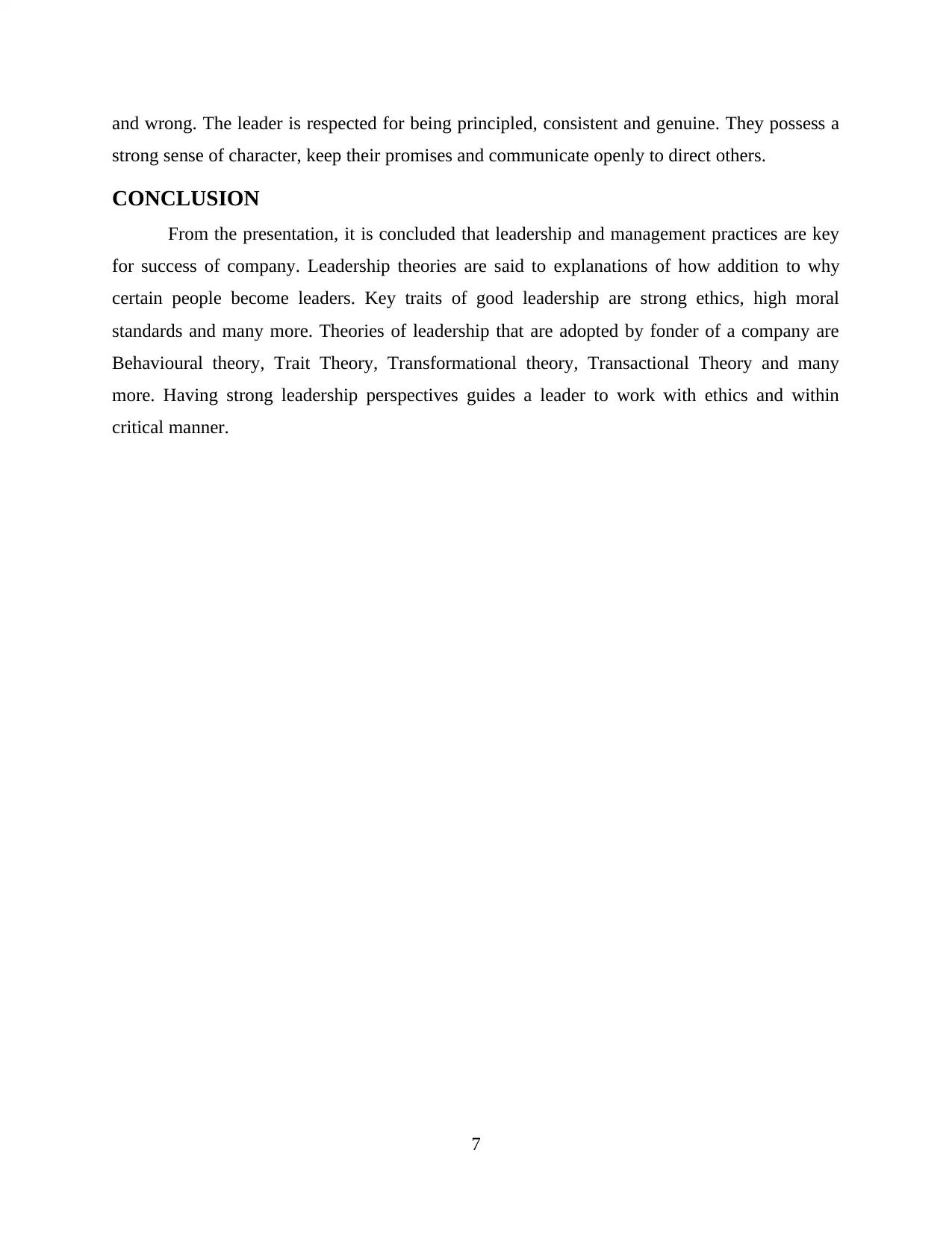
and wrong. The leader is respected for being principled, consistent and genuine. They possess a
strong sense of character, keep their promises and communicate openly to direct others.
CONCLUSION
From the presentation, it is concluded that leadership and management practices are key
for success of company. Leadership theories are said to explanations of how addition to why
certain people become leaders. Key traits of good leadership are strong ethics, high moral
standards and many more. Theories of leadership that are adopted by fonder of a company are
Behavioural theory, Trait Theory, Transformational theory, Transactional Theory and many
more. Having strong leadership perspectives guides a leader to work with ethics and within
critical manner.
7
strong sense of character, keep their promises and communicate openly to direct others.
CONCLUSION
From the presentation, it is concluded that leadership and management practices are key
for success of company. Leadership theories are said to explanations of how addition to why
certain people become leaders. Key traits of good leadership are strong ethics, high moral
standards and many more. Theories of leadership that are adopted by fonder of a company are
Behavioural theory, Trait Theory, Transformational theory, Transactional Theory and many
more. Having strong leadership perspectives guides a leader to work with ethics and within
critical manner.
7
Paraphrase This Document
Need a fresh take? Get an instant paraphrase of this document with our AI Paraphraser

REFERENCES
Books and Journals:
Burfeind, J., 2019. Leading Cultural Change in the Newspaper Industry: How Jeff Bezos saved
The Washington Post. Manager, (29), pp.125-138.
Calvo, J., 2020. Journey of the Future Enterprise: How to Compete in the Age of Moonshot
Leadership and Exponential Organizations. Libros de Cabecera.
Gobble, M. M., 2017. The value of followership. Research-Technology Management, 60(4),
pp.59-63.
Graham, S., 2019. Identity Leadership: To Lead Others You Must First Lead Yourself. Hachette
UK.
Kelly, R., 2019. Leadership Development and Structure—From Egosystems to Ecosystems.
In Constructing Leadership 4.0 (pp. 69-99). Palgrave Macmillan, Cham.
Lang, D., Handley, M. and Jablokow, K., 2018. The competencies of innovation leaders.
In Innovation Leadership (pp. 15-28). Routledge.
Mooers, J., 2020. Review and analysis of all shareholder letters from Warren Buffett and Jeff
Bezos. Rock Center for Corporate Governance at Stanford University Working Paper,
(243).
Moore, D. A., 2021. Perfectly Confident Leadership. California Management Review,
p.0008125621992173.
Online:
Jeff Bezos Leadership Style. 2021. [Online]. Available through: <
https://financhill.com/blog/investing/jeff-bezos-leadership-style>
(Burfeind, 2019) (Calvo, 2020) (Gobble, 2017) (Graham, 2019) (Kelly, 2019) (Lang, Handley
and Jablokow, 2018) (Mooers, 2020) (Moore, 2021) (Jeff Bezos Leadership Style, 2021)
8
Books and Journals:
Burfeind, J., 2019. Leading Cultural Change in the Newspaper Industry: How Jeff Bezos saved
The Washington Post. Manager, (29), pp.125-138.
Calvo, J., 2020. Journey of the Future Enterprise: How to Compete in the Age of Moonshot
Leadership and Exponential Organizations. Libros de Cabecera.
Gobble, M. M., 2017. The value of followership. Research-Technology Management, 60(4),
pp.59-63.
Graham, S., 2019. Identity Leadership: To Lead Others You Must First Lead Yourself. Hachette
UK.
Kelly, R., 2019. Leadership Development and Structure—From Egosystems to Ecosystems.
In Constructing Leadership 4.0 (pp. 69-99). Palgrave Macmillan, Cham.
Lang, D., Handley, M. and Jablokow, K., 2018. The competencies of innovation leaders.
In Innovation Leadership (pp. 15-28). Routledge.
Mooers, J., 2020. Review and analysis of all shareholder letters from Warren Buffett and Jeff
Bezos. Rock Center for Corporate Governance at Stanford University Working Paper,
(243).
Moore, D. A., 2021. Perfectly Confident Leadership. California Management Review,
p.0008125621992173.
Online:
Jeff Bezos Leadership Style. 2021. [Online]. Available through: <
https://financhill.com/blog/investing/jeff-bezos-leadership-style>
(Burfeind, 2019) (Calvo, 2020) (Gobble, 2017) (Graham, 2019) (Kelly, 2019) (Lang, Handley
and Jablokow, 2018) (Mooers, 2020) (Moore, 2021) (Jeff Bezos Leadership Style, 2021)
8
1 out of 11
Related Documents
Your All-in-One AI-Powered Toolkit for Academic Success.
+13062052269
info@desklib.com
Available 24*7 on WhatsApp / Email
![[object Object]](/_next/static/media/star-bottom.7253800d.svg)
Unlock your academic potential
Copyright © 2020–2026 A2Z Services. All Rights Reserved. Developed and managed by ZUCOL.





